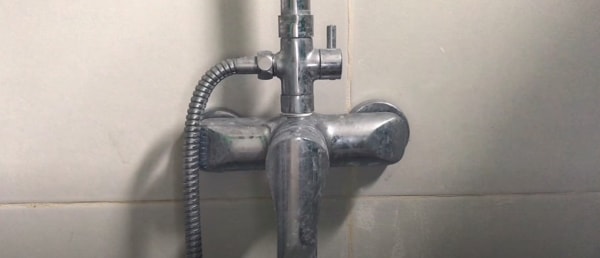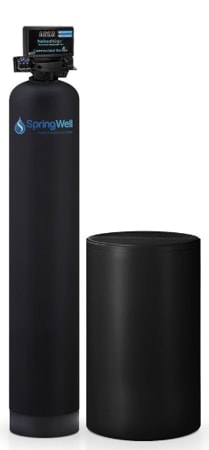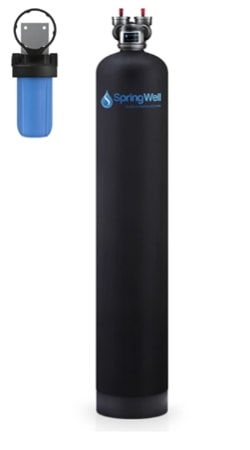The most common well water problem is a white residue on appliances, plumbing fixtures, crockery items, and even clothes. Though it may seem frustrating and tough to remove, most white residue problems can be fixed if you know how to do it.

Common Causes for White Residue with Well Water
The primary reason behind white residue from well water is a high concentration of minerals like calcium and magnesium. These two also make your water hard. The white residue on your appliances, plumbing fixtures, bathtubs, and laundry is due to hard water.
Calcium and magnesium enter well water as a result of underground water movement. These minerals are present in soil and rocks. Moreover, calcium and magnesium are soluble elements in water and hence cannot be removed with a sediment filter.
Other minerals like sodium, potassium, phosphorous, and fluoride can also cause white buildup on your taps. Though it happens rarely, it is worth knowing.
Higher iron levels in well water can also leave stains on your appliances. Iron enters well water underground or through rusted plumbing pipes in your home. Well water also picks up iron as it moves underground.
A faulty water softener or wrong settings are often the reason behind the white residue from well water. Check settings if you recently installed a water softener. If the settings are correct, your softener may require servicing or replacement if you have an old unit.
How can I Identify what’s causing the White Scale on my Appliances?
A water test is the only reliable way to identify the culprits behind a white residue. A water test will also calculate the hardness level in your water so you can select the right treatment unit.
The EPA recommends annual testing for private wells so you can modify your water treatment options accordingly.
How to Treat White Scale from Well Water?
White residue/limescale looks awful and can damage your appliances if not treated. There are two ways to deal with this problem. Let’s check out both.
Instant Remedy for Leftover White Residue Stains
You can use a DIY cleaning solution or a commercial cleaner to remove white residue from faucets, taps, showerheads, toilets, and appliances. These cleaners work instantly by removing the deposits but do not guarantee prevention.
Long Term Solutions
The best way to deal with these stains is to install a water softener at your home. There are two types of water softeners; salt-based or salt-free (water conditioner).
Salt-Based Water Softeners
These machines utilize a softening salt to remove calcium and magnesium from your well water. The process is known as ion exchange as it replaces calcium and magnesium with sodium or potassium. A salt-based water softener regenerates periodically and requires a discharge arrangement. Please note that some states prohibit salt-based water softeners, so check local laws before buying one.
Recommended Salt-Based Water Softener: SpringWell’s Salt Based Water Softener System

SpringWell’s salt-based water softener is a costly but reliable and 100% effective way to make well water soft. The unit has a separate brine tank for better performance and easy maintenance.
You can manage the unit through the Bluetooth control head and set it to automatic regeneration. The softener can make extremely hard water soft. It is easy to install and can be paired with a whole-house water filter or a UV purifier.
Salt-Free Water Softeners
A salt-free water softener is also known as a water conditioner. A water conditioner doesn’t remove or add anything to water; it changes how water interacts with other surfaces. A water conditioner uses magnetic force to crystallize calcium and magnesium in water, so they don’t stick to surfaces. Please note that water conditioners do not eliminate the stains; they just reduce them.
Recommended Salt-Free Water Softener (Water Conditioner): SpringWell’s FutureSoft® Salt-Free Water Softener

SpringWell is different than ordinary salt-free units because it is more powerful, can handle extremely hard water, and deliver up to 20 GPM flow rate.
The unit is easy to install and doesn’t require brine discharge or periodic salt replacement. You can pair it with a UV purifier, RO system, or a whole house water filtration unit.
Reverse Osmosis System
While most well owners install RO systems for drinking and cooking, a whole-house RO unit can also remove white sediment and residue from the water.
An RO system is famous for removing TDS and micro-sized contaminants from well water. However, you cannot rely on a small system to treat water for your whole house. A bigger RO system has multiple times more capacity than a smaller unit. It comes with a storage tank that provides water at a decent flow rate.
Most people don’t prefer installing such units because they are initially expensive and difficult to maintain in the long run. Moreover, they also require large space. Hence, a water softener is usually preferred for white residue removal.
Is it safe to drink water with calcium in it?
Yes. Your body needs calcium for bone growth and tissue development. Hence, it is 100% safe to drink water with calcium in it.
Is hard water bad for your health?
Hard water isn’t bad for your health as it contains calcium, magnesium, and iron. All three are required by your system for proper functioning and growth. However, these minerals can wreak havoc on your plumbing fixtures and appliances.
What are some of the problems associated with white residue in well water?
The white residue stains and deposits on your appliances, faucets, and fixtures are hard water stains. If not taken care of, these deposits can damage your home’s plumbing and appliances. This makes it difficult for household cleaning tasks like laundry and dishwashing and increases detergent usage.
Hard water can also reduce the water flow rate, discolor tiles, and reduce water heater performance. The water may develop a bitter taste in some cases.
How can I avoid the white residue on my coffee maker?
A water softener will solve the white residue/scale problem for most of your appliances. However, some coffee makers are extremely sensitive to contaminants in water. You can use distilled water in such machines or get a countertop distiller to use with a coffee maker.
